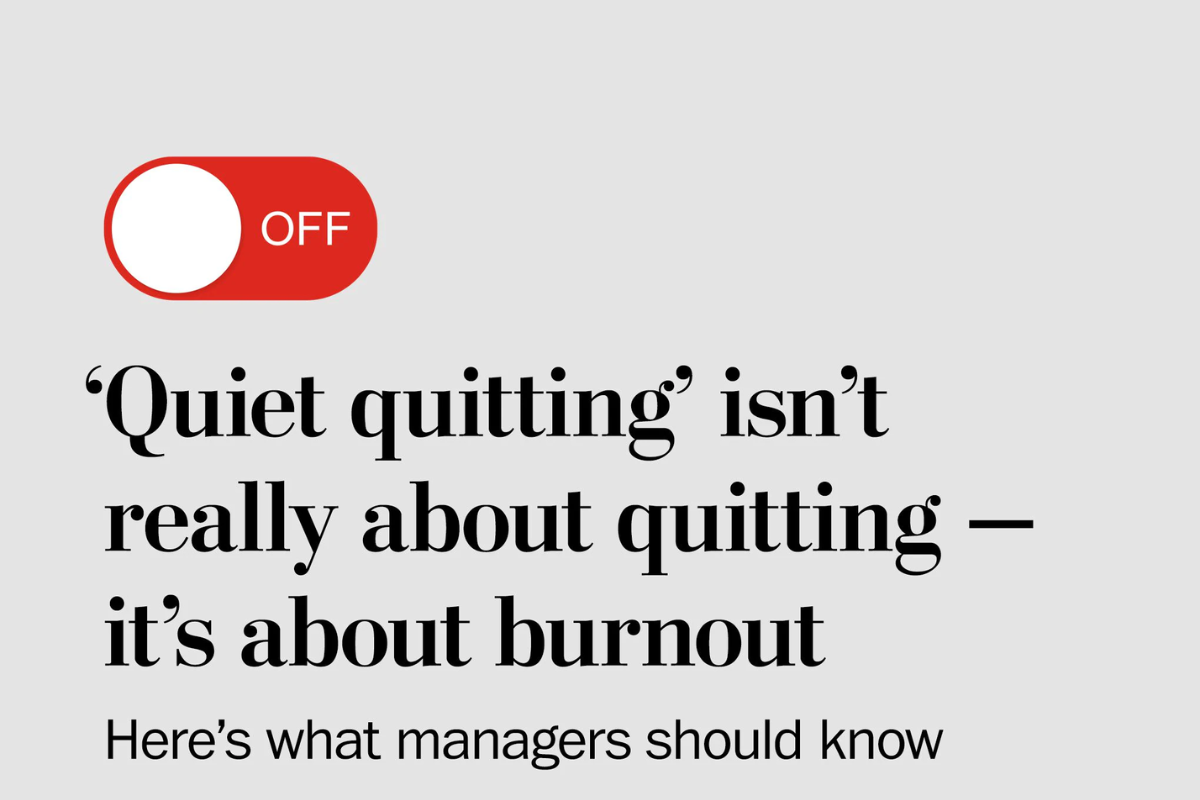Quiet quitting is a new term, but not a new concept. The term, which gained popularity recently, refers to a concept in which overwhelmed and overworked employees stop going above and beyond and instead do the minimum requirements of their job, putting in no more time, effort, or enthusiasm than absolutely necessary. This concept is also known as "silent quitting."
For example, these employees may decline new projects, cease volunteering for tasks, accept only easy assignments, or claim to be too busy to assist co-workers or managers. These team members may be in the process of job-searching or might have no intention of leaving but no longer have the drive to exceed expectations.
The Changing Landscape of the Dubai Workplace
Dubai, widely recognized for its buzzing business environment and ambitious professionals, is also seeing a troubling trend of workplace quiet quitting. The dynamics of the Dubai workplace have changed dramatically over the years. Employees are frequently caught in a demanding and stressful environment due to intense competition, long working hours, and high expectations. While Dubai has made significant progress in developing a positive work culture, the pressures of meeting targets and delivering results can have a negative impact on employees' mental health.
The trend of Quiet Quitting is concerning because it indicates a misunderstanding between the employer and the employee regarding expectations. The problem is not that the employee refuses to do more work than is required. Instead, the employee lacks confidence in their employer's ability to moderate their workload or adequately compensate them for their efforts. This phenomenon has the potential to weaken the manager-employee relationship, lead to or intensify team member dissatisfaction, and create conflict and a toxic work environment for other employees. As a result, it is in a manager's best interest to identify and correct a problem as soon as possible.
Causes of Quiet Quitting
Excess Workload
One frequent complaint from quiet quitters is that they are "doing the work of 2-3 employees." Quiet quitters are usually once-passionate employees who were overburdened and overworked to the point of burnout. This increased workload maybe caused by staff turnover - instead of the manager reducing the workload when an employee leaves, other team members pick up the slack until a new hire arrives. Overwork can also be caused by an employee picking up the slack for other team members or by a lack of accountability within the group. Employees may feel compelled to do extra work to keep up with co-workers or to prove themselves. All this may lead to employees becoming exhausted and frustrated.
Poor Compensation
One justification for quiet quitting is "only doing the work you're paid for." Many quiet quitters believe they work too hard for too little pay. The true root of this issue is that employees believe they are being unfairly rewarded for their efforts. Employees, in turn, reduce their efforts. Frequently, these team members have asked for higher pay and been turned down, or they have reason to believe that the employer will not listen to their requests.
Blurred Boundaries
Quiet Quitting is often an effect of a lack of work-life balance and a neglect of work and personal boundaries. Possibly, co-workers or managers call or email after hours and expect the employee to respond. Maybe work interferes with vacations, managers deny leave requests, or it's the result of repeated overstepping. Employees who believe that the company will not respect and protect their personal time will go to extremes to implement those boundaries.
Lack of Manager Support
Employees are often able and willing to put up with difficult working conditions if they know their boss is on their side. A supportive and considerate manager can go a long way toward motivating employees. Team members are more likely to leave if they believe their managers are not looking out for their best interests or cannot advocate for them. When employees believe their executives are unable or unwilling to assist them, they help themselves by building barriers. These managers are not necessarily bad bosses, but they may be unaware, overwhelmed, or ineffective in relieving employee burdens. Employees frequently express their concerns and request assistance, but managers either act too slowly or never act.
Unclear or Shifting Expectations
Quiet Quitter’s mantra is, "This is not the job I signed up for." These employees believe their employers have unreasonable expectations and demands. Simply put, quiet quitters believe that their employers expect too much of them. Managers may continue to add responsibilities outside of the job description without prior discussion. Perhaps the employee ends up working in a completely different position than the one for which they were hired or takes on a dual role and performs the duties of two or three different positions. Occasionally, employees misinterpret managers' expectations, and the employer fails to correct this misunderstanding.
Poor Communication or Conflict Resolution Skills
Quiet quitting can occur when an employee does not know how to express their concerns or is afraid to upset the status quo. When an employee fails to adequately explain problems to leadership or incorrectly assumes that leadership is already aware, the team member may believe the manager is ignoring or dismissing their concerns. Perhaps the employee is afraid of conflict and never raises the issue, instead quietly withdrawing and not informing the boss. The employee is not entirely to blame. It is the employer's responsibility to create a safe environment in which employees feel comfortable speaking up.
Fear of Repercussions
Employees may be afraid of retaliation, damage to their professional reputation, or difficulties finding future job possibilities if they openly criticize or leave their current position. The highly competitive nature of the Dubai job market may intensify these concerns.
Signs of Quiet Quitting
Decrease in Productivity
One of the most obvious signs of quiet quitting is decrease in productivity. Employees who were once considered superstars are now considered average. The productivity drops. Maybe the employee stops striving once monthly quotas are met. If the employee is not directly addressed, he or she may stop speaking up in meetings. Managers should, however, take note of and monitor this type of change in performance because it could indicate the start of quiet quitting or the presence of another problem.
Stops Taking Initiative
Once upon a time, an employee approached you with new concepts, was active in problem-solving, and brainstormed new ideas. When you asked for volunteers to tackle tasks, your employee was the first to volunteer. This employee now only follows instructions and takes no initiative. They may withdraw from committees or decline to participate in new projects. You must approach them because they will no longer approach you. This change in behaviour is noteworthy because it may indicate a shift in mood, attitude, and job satisfaction.
Avoidance and Distance
Quiet quitters are typically conflict-averse or simply exhausted by conflict. Instead of bringing the issues to light, they simply fade away. This employee may be constantly and conveniently occupied, or he or she may not be available to ask for support. It becomes routine to respond to workday emails or instant messages hours or days later. The employee skips meetings and does not inquire about what they missed.
Implications for Employees and Employers
Quiet quitting can have significant consequences for both employees and employers.
For employees, it can lead to increased stress, burnout, and a decrease in overall job satisfaction. The inability to address underlying issues may have a negative impact on their professional growth and mental well-being.
Employers, on the other hand, experience lower employee productivity, higher turnover rates, and potential damage to their company's reputation. Silent resignations deprive organizations of the possibility to resolve issues and improve employee satisfaction, resulting in a negative impact on workplace morale and productivity.
Ways to Prevent Quiet Quitting

Keep increases in workload short-term
The business world is chaotic, and sometimes working overtime is required. Working at or above maximum capacity on a continuous basis is not sustainable in the long term. If you ask employees to step up and take on additional responsibilities, keep in mind that the increase should be temporary and, ideally, optional. If the employee must perform these new duties indefinitely, the new workload should be an official promotion or come with additional benefits.
Properly compensate your team
Pay disparities are one of the top reasons for quiet quitting. More than the money, the underlying cause is also a lack of respect. Employees frequently feel exploited and may believe the company is simply trying to stretch them for as much free work as possible. Maintaining employer trust requires an equal exchange of labour for compensation. Employees will likely feel undervalued if appropriate rewards for exceptional effort are not provided.
Listen to your employees
Quiet quitting does not begin quietly. Employees frequently convey issues that managers acknowledge but either fail to address or completely ignore. Team members who believe their managers are unconcerned about their troubles may take action by remaining silent. Listening to your employees and affirming their feelings and experiences can help keep team members from leaving. Employees are less likely to take matters into their own hands and fade into the background of your workplace if they believe you understand them and have their best interests at heart.
Be upfront about role growth
The truth of the ever-changing business world is that most jobs evolve beyond the job description in the posting. It is not uncommon for positions to grow in scope over time. Employees may be caught off guard if these changes occur soon after hiring or are significant. Being upfront about role growth during the interview stage is one way to avoid employees feeling like you pulled a bait and switch on the position. For instance, you could state that you see the position eventually expanding to include additional responsibilities. Discussing this possibility early on allows you to manage expectations and find a candidate who is willing to grow with you.
Implement recognition
Quiet Quitters often feel unappreciated. When work goes unrecognized and unpraised, employees believe they can stop without leadership catching on or caring, and they are frequently correct. In other words, employees believe that "if no one cares, why try?" By recognizing and rewarding employees for exceptional work, you demonstrate to your employees that what they do is important to you and the company. Furthermore, employees who are acknowledged are less likely to fade into the background.
Build rapport and relationships
Quiet quitting is the outcome of a disconnect between employees and employers. One way to bridge this gap is to build rapport and relationships with employees. Team members who believe their managers are human beings, not just authority figures or faceless entities, are more committed to their jobs. These employees are more likely to express their dissatisfaction, allowing leaders to address the problem before it escalates to quiet quitting. Fostering strong social ties among employees, co-workers, and management can foster a sense of duty and a desire to avoid unsatisfactory teammates.
Support employee wellbeing
Quiet quitting is seen as an important part of mental health by many employees. This step, however, is unnecessary if employers confront workers' needs on a proactive basis. When you prioritize your employees' mental, physical, and emotional health, they feel less compelled to guard themselves professionally against potential harm.
Encourage breaks and sustainable growth
Work goes up and down, and employees require breaks and the opportunity to recharge. A mild decrease in productivity is not cause for concern. An issue arises only when complacency becomes routine. There is a middle ground between consistent hustle and quiet quitting. Likewise, a fine balance exists between rockstar and burnout. Motivate breaks and long-term growth to keep employees from quietly quitting. You can set realistic goals that challenge employees without overwhelming them, and you can encourage your employees to recharge and regroup rather than give up.
Conclusion
The growth of quiet quitting in the Dubai workplace emphasizes the importance of organizations prioritizing employee well-being and creating an environment that fosters open communication. Employers can instill a thriving workforce that is committed, productive, and content by addressing the underlying causes of silent resignations and incorporating strategies to improve employee engagement. Finally, cultivating a positive work culture benefits both employees and organizations, making Dubai's workplace a more fulfilling and sustainable environment for all.
Also Read:















